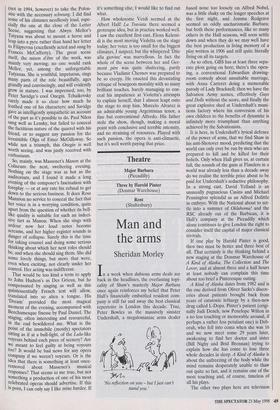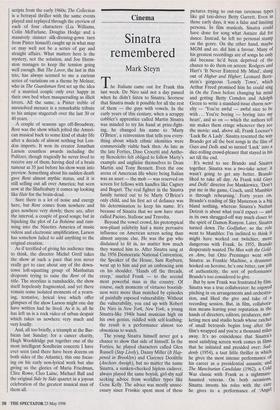Theatre
Major Barbara (Piccadilly) Three by Harold Pinter (Donmar Warehouse) Rent (Shaftesbury)
Man and the arms
Sheridan Morley
In a week when dubious arms deals are back in the headlines, the everlasting topi- cality of Shaw's masterly Major Barbara once again reinforces my belief that Peter Hall's financially embattled resident com- pany is still far and away the best classical repertoire in London this decade. True, Peter Bowles as the massively sinister Undershaft, a megalomaniac arms dealer `No reflection on you – but I just can't stand you.' based none too loosely on Alfred Nobel, was a little shaky on the longer speeches at the first night, and Jemma Redgrave seemed an oddly uncharismatic Barbara; but both these performances, like so many others in the Hall seasons, will soon settle down and when they do we may well have the best production in living memory of a play written in 1906 and still quite literally firing on all its targets.
As so often, GBS has at least three sepa- rate plots going on here; there's the open- ing, a conventional Edwardian drawing- room comedy about unsuitable marriage, with Anna Carteret doing a memorable parody of Lady Bracknell; then we have the Salvation Army scenes, effectively Guys and Dolls without the score, and finally the great explosive shed at Undershaft's muni- tions factory where his conversion of his own children to the benefits of dynamite is infinitely more triumphant than anything achieved by the Salvationists.
It is here, in Undershaft's lyrical defence of the power of arms, that we find Shaw in his anti-Shotover mood, predicting that the world can only ever be run by men who are prepared to kill and be killed for their beliefs. Only when Hall gives us, at curtain fall, the sounds of the guns at Flanders in a world war already less than a decade away do we realise the terrible price about to be paid for Undershaft's seductive philosophy. In a strong cast, David Yelland is an unusually pugnacious Cusins and Michael Pennington splendid as an Alfred Dolittle in embryo. With the National about to set- tle into a summer of Oklahoma! and the RSC already out of the Barbican, it is Hall's company at the Piccadilly which alone continues to give London the right to consider itself the capital of major classical revivals.
If one play by Harold Pinter is good, then two must be better and three best of all. That certainly is the thinking behind a new staging at the Donmar Warehouse of A Kind of Alaska, The Collection and The Lover, and at almost three and a half hours at least nobody can complain this time about too brief a Pinteresque outing.
A Kind of Alaska dates from 1982 and is the one derived from Oliver Sacks's discov- eries about patients brought back from years of catatonic lethargy by a then-new drug called L-Dopa. Pinter's patient (origi- nally Judi Dench, now Penelope Wilton in a no less touching or memorable arousal, if perhaps a rather less petulant one) is Deb- orah, who fell into coma when she was 16 and we now meet some 29 years later, awakening to find her doctor and sister (Bill Nighy and Brid Brennan) trying to explain how she has come to lose three whole decades in sleep. A Kind of Alaska is about the unfreezing of the body while the mind remains desperately unable to thaw out quite so fast, and it remains one of the most touching and, of course, timeless of all his plays.
The other two plays here are television scripts from the early 1960s; The Collection is a betrayal thriller with the same events played and replayed through the eyeview of each of four characters (Lia Williams, Colin McFarlane, Douglas Hodge and a massively sinister silk-dressing-gown turn from Pinter himself) caught up in what may or may well not be a series of gay and straight affairs. What matters here is the mystery, not the solution, and Joe Harm- ston manages to keep the tension going well enough. But The Lover, the last in this trio, has always seemed to me a curious series of variations on a theme by Molnar, who in The Guardsman first set up the idea of a married couple only ever happy in their own bed when masquerading as illicit lovers. All the same, a Pinter treble of unresolved menace is a remarkable tribute to his unique stagecraft over the last 30 or 40 years.
A couple of seasons ago off-Broadway, Rent was the show which jolted the Ameri- can musical back to some kind of shaky life after a decade of almost nothing but Lon- don imports. It won its creator Jonathan Larson countless awards including the Pulitzer, though tragically he never lived to receive any of them, having died of a brain tumour at 35 just before his show went into preview. Something about his sudden death gave Rent almost mythic status, and it is still selling out all over America; but seen now at the Shaftesbury it comes up looking like Hair for the brain-dead.
Sure there is a lot of noise and energy here, but Rent comes from nowhere and goes nowhere very slowly; there are, after the interval, a couple of good songs; but in hijacking the plot of La Boheme and ram- ming into the Nineties America of music videos and electronic amplification, Larson has somehow failed to add anything to the original creation.
As if terrified of giving his audience time to think, the director Michel Greif takes the show at such a pace that you never really get to care about any of the down- town loft-squatting group of Manhattan dropouts trying to raise the Rent of the title. The storyline is ramshackle, the show itself hopelessly fragmented, and yet there remain some isolated moments of a yearn- ing, tentative, lyrical love which offer glimpses of the show Larson might one day have written had he lived. As it is, all he has left us is a rock video of urban despair which takes us nowhere very much and very loudly.
And, all too briefly, a triumph at the Bar- bican last Sunday; for a cancer charity, Hugh Wooldridge put together one of the most intelligent Sondheim concerts I have ever seen (and there have been dozens on both sides of the Atlantic), this one focus- ing on his early non-lyrical work but also giving us the glories of Maria Friedman, Clive Rowe, Cleo Laine, Michael Ball and the original Side by Side quartet in a joyous celebration of the greatest musical man of them all.



































































 Previous page
Previous page